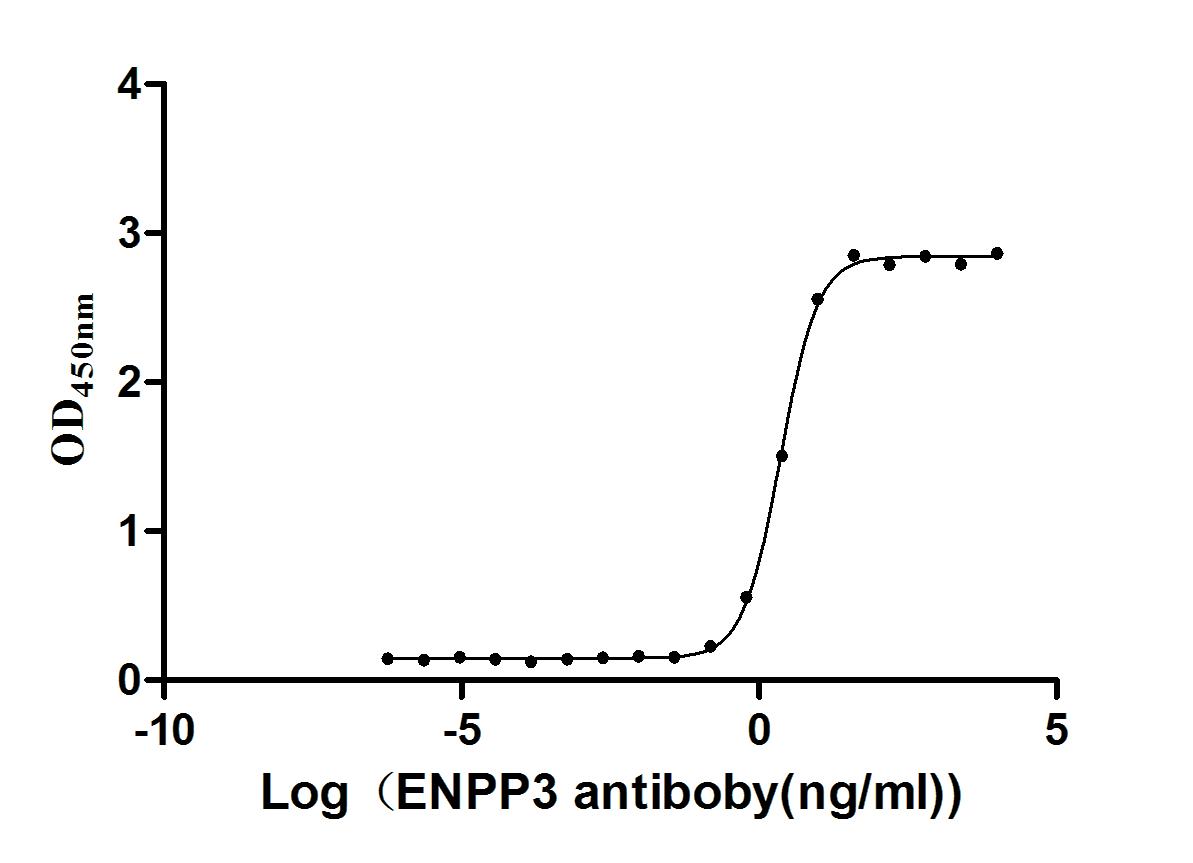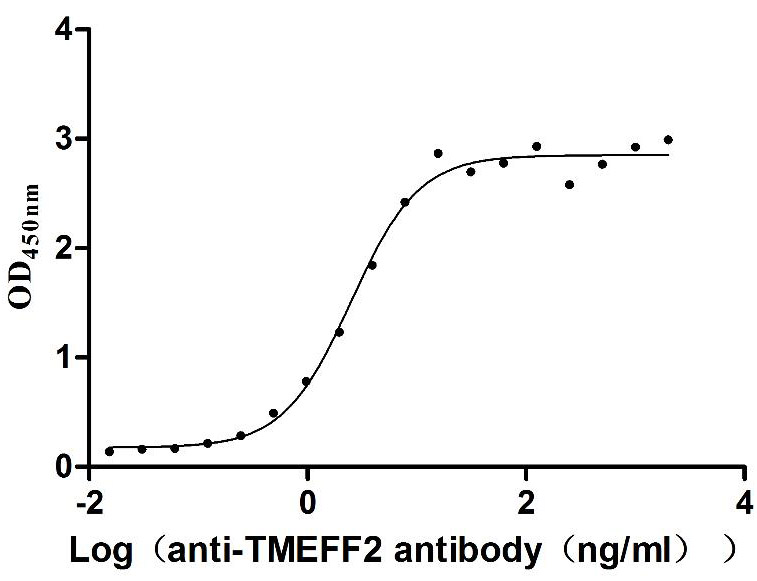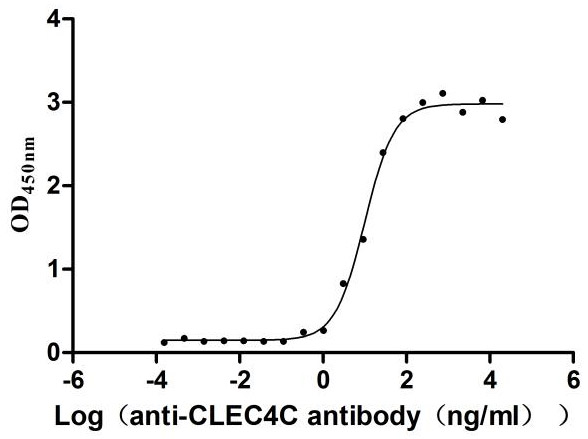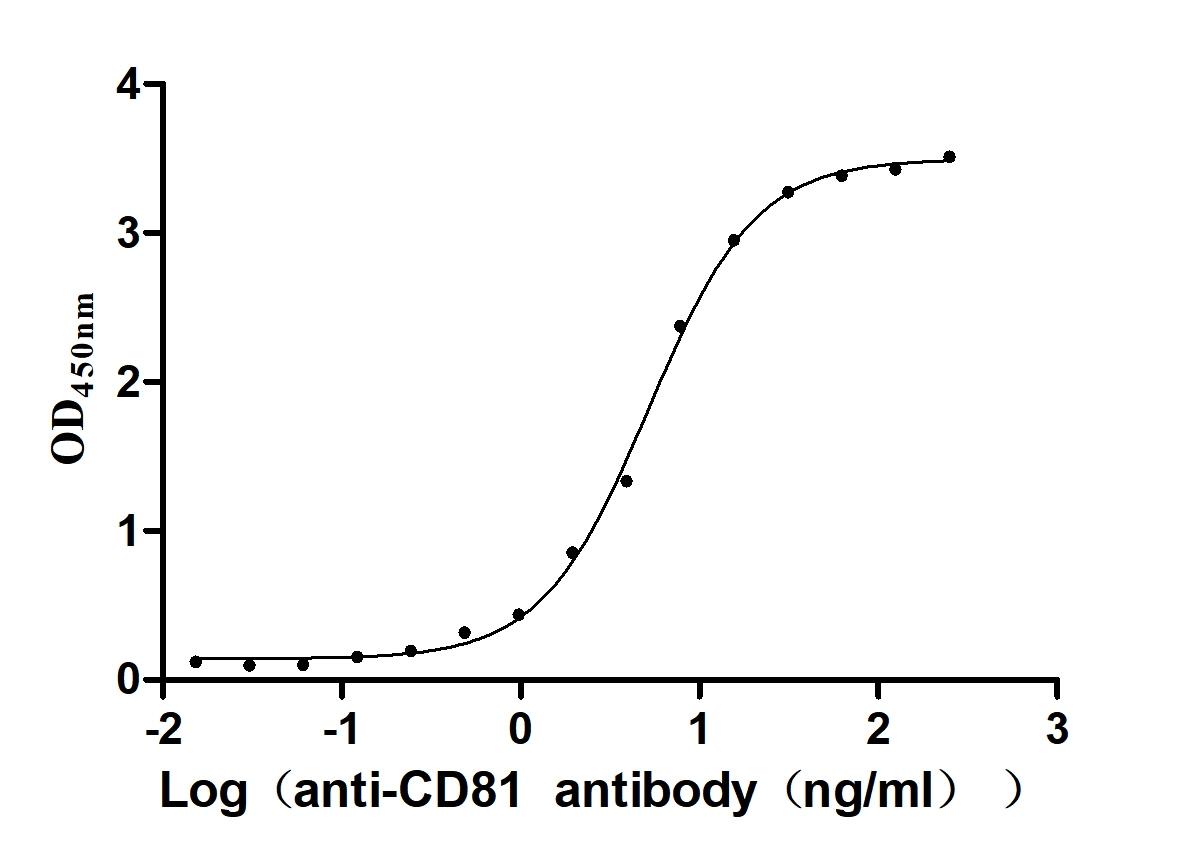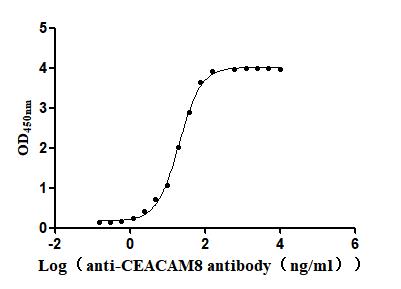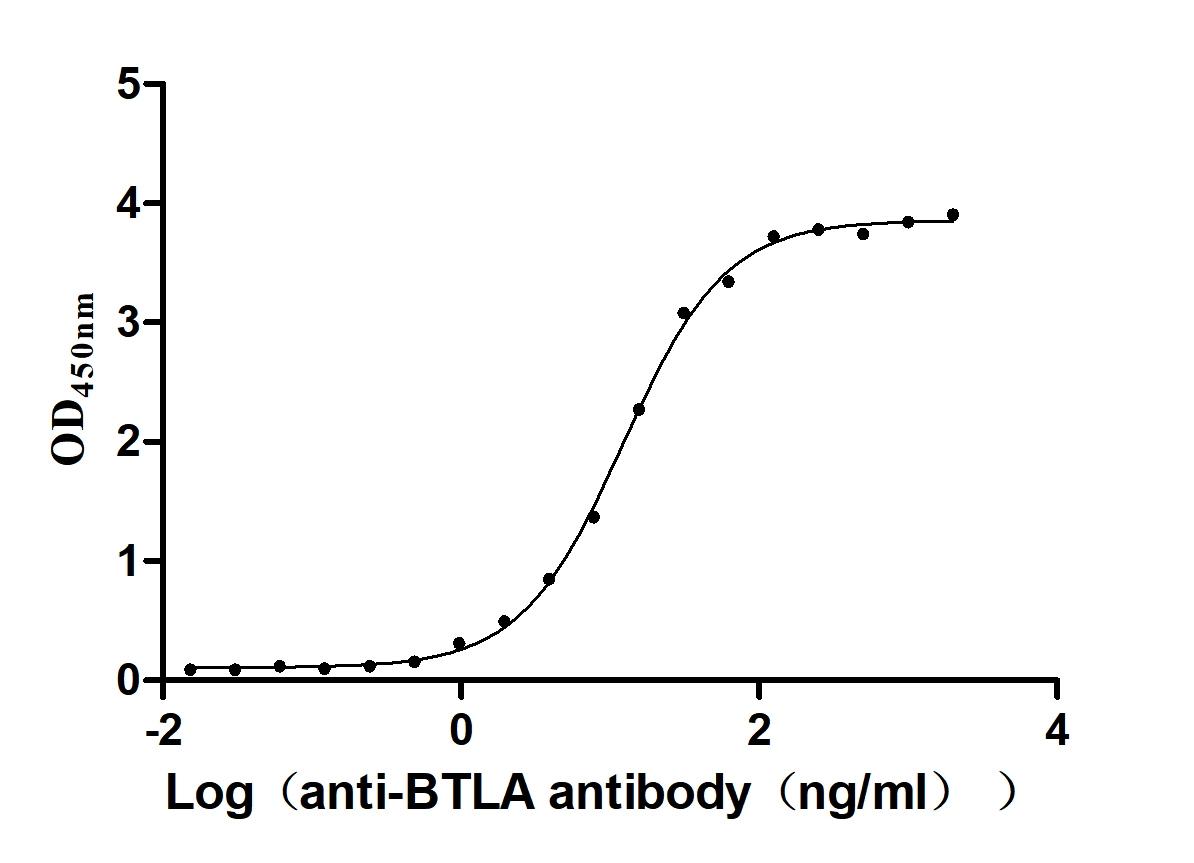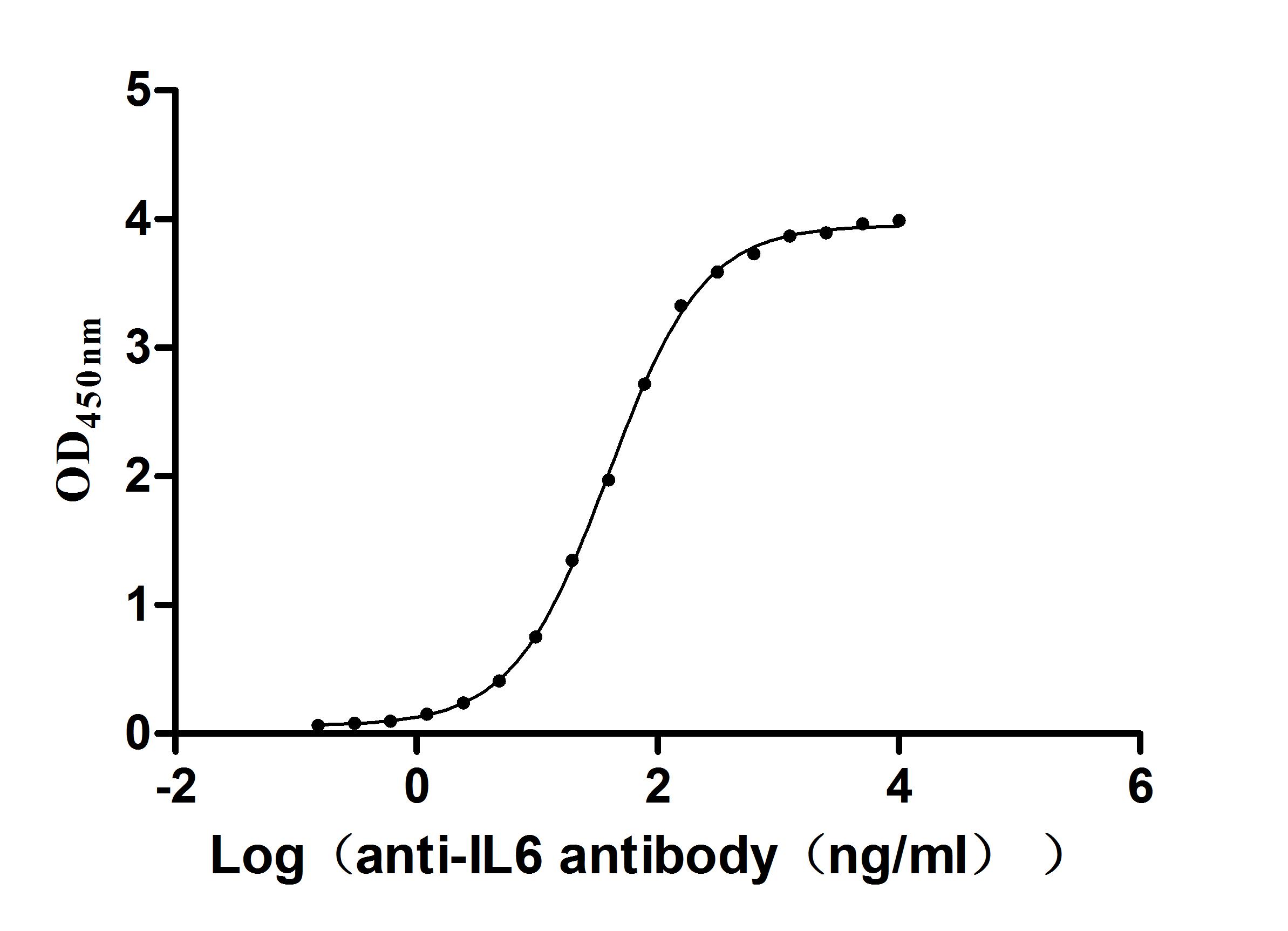Recombinant Human Fukutin-related protein (FKRP), partial
-
货号:CSB-YP862050HU
-
规格:
-
来源:Yeast
-
其他:
-
货号:CSB-EP862050HU
-
规格:
-
来源:E.coli
-
其他:
-
货号:CSB-EP862050HU-B
-
规格:
-
来源:E.coli
-
共轭:Avi-tag Biotinylated
E. coli biotin ligase (BirA) is highly specific in covalently attaching biotin to the 15 amino acid AviTag peptide. This recombinant protein was biotinylated in vivo by AviTag-BirA technology, which method is BriA catalyzes amide linkage between the biotin and the specific lysine of the AviTag.
-
其他:
-
货号:CSB-BP862050HU
-
规格:
-
来源:Baculovirus
-
其他:
-
货号:CSB-MP862050HU
-
规格:
-
来源:Mammalian cell
-
其他:
产品详情
-
纯度:>85% (SDS-PAGE)
-
基因名:
-
Uniprot No.:
-
别名:Fkrp; FKRP_HUMAN; FLJ12576; Fukutin related protein; Fukutin-related protein; LGMD2I; MDC1C; MGC2991
-
种属:Homo sapiens (Human)
-
蛋白长度:Partial
-
蛋白标签:Tag type will be determined during the manufacturing process.
The tag type will be determined during production process. If you have specified tag type, please tell us and we will develop the specified tag preferentially. -
产品提供形式:Lyophilized powder
Note: We will preferentially ship the format that we have in stock, however, if you have any special requirement for the format, please remark your requirement when placing the order, we will prepare according to your demand. -
复溶:We recommend that this vial be briefly centrifuged prior to opening to bring the contents to the bottom. Please reconstitute protein in deionized sterile water to a concentration of 0.1-1.0 mg/mL.We recommend to add 5-50% of glycerol (final concentration) and aliquot for long-term storage at -20℃/-80℃. Our default final concentration of glycerol is 50%. Customers could use it as reference.
-
储存条件:Store at -20°C/-80°C upon receipt, aliquoting is necessary for mutiple use. Avoid repeated freeze-thaw cycles.
-
保质期:The shelf life is related to many factors, storage state, buffer ingredients, storage temperature and the stability of the protein itself.
Generally, the shelf life of liquid form is 6 months at -20°C/-80°C. The shelf life of lyophilized form is 12 months at -20°C/-80°C. -
货期:Delivery time may differ from different purchasing way or location, please kindly consult your local distributors for specific delivery time.Note: All of our proteins are default shipped with normal blue ice packs, if you request to ship with dry ice, please communicate with us in advance and extra fees will be charged.
-
注意事项:Repeated freezing and thawing is not recommended. Store working aliquots at 4°C for up to one week.
-
Datasheet :Please contact us to get it.
相关产品
靶点详情
-
功能:Catalyzes the transfer of CDP-ribitol to ribitol 5-phosphate previously attached by FKTN/fukutin of to the phosphorylated O-mannosyl trisaccharide (N-acetylgalactosamine-beta-3-N-acetylglucosamine-beta-4-(phosphate-6-)mannose), a carbohydrate structure present in alpha-dystroglycan (DAG1). This constitutes the second step in the formation of the ribose 5-phosphate tandem repeat which links the phosphorylated O-mannosyl trisaccharide to the ligand binding moiety composed of repeats of 3-xylosyl-alpha-1,3-glucuronic acid-beta-1.
-
基因功能参考文献:
- The FKRP-related disorders should be included as a differential diagnosis in Mexican patients with neuromuscular disorders and normal results on DMD gene deletion/duplication analysis. This and previous reports, along with data from the main genotype databases, collectively suggest that in Mexico the FKRP-related disorders are due to the p.(Asn463Asp) and the common European p.(Leu276Ile) pathogenic variants. PMID: 29065428
- The results suggest that fukutin and FKRP not only participate in the synthesis of O-mannosyl glycans added to alpha-dystroglycan in the endoplasmic reticulum and Golgi complex, but that they could also play a role, that remains to be established, in the nucleus of retinal neurons. PMID: 29416295
- This literature review revealed that pathogenic mutations in the FKRP gene in Asian LGMD2I patients are compound heterozygous rather than homozygous. PMID: 28931339
- Next generation and Sanger sequencing were performed for I-2. Heterozygous FKRP mutations were identified in exon 4: c.1167_1168delGC, p.Gly391Leufs *72 and c.501_502GT>CC, p.Arg167Ser, p.Cys168Arg PMID: 28629604
- Fukutin, FKRP, and TMEM5 form a complex while maintaining each of their enzyme activities. Data showed that endogenous fukutin and FKRP enzyme activities coexist with TMEM5 enzyme activity, and suggest the possibility that formation of this enzyme complex may contribute to specific and prompt biosynthesis of glycans that are required for dystroglycan function. PMID: 29477842
- This study have demonstrated that the clinical heterogeneity in LGMD2I patients, homozygous for FKRP c.826C>A, cannot be explained by histopathological alterations, levels of alpha-DG hypoglycosylation or laminin alpha2 depletion. PMID: 28479227
- Dystrophic Pathology in Diaphragm and Impairment of Cardiac Function in FKRP P448L Mutant Mice PMID: 27711214
- The 13 novel mutations of FKRP significantly expanded the mutation spectrum of MDC1C and LGMD2I, and the different founder mutations indicate the ethnic difference in FKRP mutations. PMID: 27439679
- Fukutin and fukutin-related protein are sequentially acting Rbo5P transferases that use cytidine diphosphate ribitol. PMID: 26923585
- Muscular dystrophies can present with rhabdomyolysis; FKRP mutations are particularly frequent in causing such complication. PMID: 26810512
- This provide a new mouse model of Limb-Girdle Muscular Dystrophy Type 2I homozygous for the Common L276I Mutation. PMID: 26574668
- This study demonistrated that the higher frequency of LGMD2I with cardiomyopathy in mutation of FKRP in Taiwanese patients. PMID: 23800702
- FKRP co-localises with the middle-to-trans-Golgi marker MG160, between the myofibrils in human rectus femoris muscle fibres. PMID: 21886772
- Mutations in FKRP lead to a glycosylation defect and subsequently downregulation of alpha-dystroglycan which constitutes an essential component of the proteoglycan-dystrophin complex. PMID: 21311896
- Study revealed a large homozygous block at the LGMD2I locus, and direct sequencing of FKRP encoding fukutin-related-protein detected the common homozygous c.826 C>A (p.Leu276Ile) mutation. PMID: 21172462
- Two novel heterozygous mutations (c.208T>A and c.1030G>T) in the FKRP gene were identified in Chinese brothers with progressive shoulder and pelvic muscle weakness PMID: 21296577
- This study identified FKRP mutations on both alleles in 88 patients from 69 families with Limb Girdle Muscular Dystrophy Type 2I. PMID: 20961759
- two siblings carrying a homozygous mutation in the start codon of FKRP that is likely to result in a loss of functional FKRP protein. The clinical phenotype of the patients was consistent with Walker-Warburg syndrome PMID: 20236121
- our study confirms that typical clinical symptoms (calf hypertrophy, cardiac involvement, mild LGMD) of LGMD2I due the homozygous c.826C[A mutation, are rather frequent in Germany PMID: 19820980
- Co-injection of fish or human FKRP mRNA along with the morpholino restored normal development and alpha-dystroglycan glycosylation. PMID: 19955119
- Alteration of the secretion pathway by different mutations may contribute to wide variations in phenotypes associated with FKRP-related diseases such as muscular dystrophy. PMID: 19900540
- FKRP mutations can result in muscular dystrophy with mental retardation & cerebellar cysts, adding structural brain defects to the FKRP mutation spectrum. Depletion of alpha-dystroglycan expression suggests FKRP involvement in its processing. PMID: 12654965
- patients with mutations in the fukutin-related protein (FKPR) gene had congenital muscular dystrophy PMID: 12666124
- particular FKRP mutations in the homozygous state induce structural and clinical neurological lesions in addition to muscular dystrophy PMID: 14652796
- Data suggest that fukutin and fukutin-related protein (FKRP) may be involved at different steps in O-mannosylglycan synthesis of alpha-dystroglycan, and FKRP is most likely involved in the initial step in this synthesis. PMID: 15213246
- pathogenesis of congenital muscular dystrophies, severity is related to ability to transport protein to ER PMID: 15574464
- a type of LGMD in the Hutterite population maps to chromosome 19q31-q33 and is due to homozygosity for the L276I mutation in FKRP. PMID: 15580560
- Three siblings without clinical signs of muscle dystrophy, but with dilated cardiomyopathy have C826A Fukutin-related protein mutation. PMID: 15833432
- A FKRP point mutation, L276I has been found in all patients with LGMD2I studied so far. The s screened for this mutation in 102 sporadic cases of Duchenne/Becker mutation-negative patients and found 13 patients with LGMD2I. PMID: 15883334
- Retention in the endoplasmic reticulum of FKRP is not the main mechanism of disease; this may instead relate to a disruption of the functional activity of this putative enzyme with its substrate(s) in the Golgi. PMID: 16055117
- FKRP mutations are a frequent cause of limb-girdle muscular dystrophies. The degree of respiratory and cardiac insufficiency in patients did not correlate with the severity of muscle involvement. PMID: 16344347
- A novel FKRP gene((c.823C>T (p.R275C) and c.948delC)mutation in a Taiwanese patient with limb-girdle muscular dystrophy 2I PMID: 17055682
- We report a limb-girdle muscular dystrophy 2I family with three affected sisters and a highly variable clinical course. FKRP gene sequencing showed that all three sisters carried a nonsense paternal mutation (W225X). PMID: 17113772
- two unrelated Mexican children with congenital muscular dystrophy who each have the identical, novel 1387A>G, N463D mutation. PMID: 17336067
- 3 new FKRP mutations were identified: L322V, L489R and R275G. PMID: 17351538
- Limb-girdle muscular dystrophy (LGMD) type 2I, caused by mutations in the fukutin-related protein gene (FKRP). PMID: 17446099
- The unfolded protein response is activated in LGMD2I muscle biopsies in limb girdle muscular dystrophy type 2I. PMID: 17952692
- severe dilated cardiomyopathy requiring heart transplantation in a homozygous p.Leu276Ile mutation in Fukutin-related protein gene (FKRP) PMID: 18060779
- findings detected a homozygous mutation of the FKRP gene (826C>A) in two unrelated patients with limb-girdle muscular dystrophy 2I with necrotic myopathy with numerous rimmed vacuoles PMID: 18593008
- In our population of LGMD2I patients, different mutations in the FKRP gene are associated with several secondary muscle protein reductions, and the deficiencies of alpha2-laminin and alpha-DG on sections are prevalent. PMID: 18645206
- Data show that four sibs belonging to a second Tunisian LGMD2I family show variable cardiac involvement with FKRP gene mutations. PMID: 18671187
- mutation spectrum associted with limb-girdle muscular dystrophy variability and serverity PMID: 19917824
- Limb girdle muscular dystrophy 2I is a milder allelic variant of MDC1C. PMID: 11741828
显示更多
收起更多
-
相关疾病:Muscular dystrophy-dystroglycanopathy congenital with brain and eye anomalies A5 (MDDGA5); Muscular dystrophy-dystroglycanopathy congenital with or without mental retardation B5 (MDDGB5); Muscular dystrophy-dystroglycanopathy limb-girdle C5 (MDDGC5)
-
亚细胞定位:Golgi apparatus membrane; Single-pass type II membrane protein. Secreted. Cell membrane, sarcolemma. Rough endoplasmic reticulum. Cytoplasm.
-
蛋白家族:LicD transferase family
-
组织特异性:Expressed in the retina (at protein level). Expressed predominantly in skeletal muscle, placenta, and heart and relatively weakly in brain, lung, liver, kidney, and pancreas.
-
数据库链接:
HGNC: 17997
OMIM: 606596
KEGG: hsa:79147
STRING: 9606.ENSP00000326570
UniGene: Hs.515493
Most popular with customers
-
Express system: Mammalian cell
Species: Homo sapiens (Human)
-
Recombinant Human Tomoregulin-2 (TMEFF2), partial (Active)
Express system: Mammalian cell
Species: Homo sapiens (Human)
-
Recombinant Human C-type lectin domain family 4 member C (CLEC4C), partial (Active)
Express system: Mammalian cell
Species: Homo sapiens (Human)
-
Recombinant Human CD81 antigen (CD81), partial (Active)
Express system: Mammalian cell
Species: Homo sapiens (Human)
-
Recombinant Human Carcinoembryonic antigen-related cell adhesion molecule 8(CEACAM8) (Active)
Express system: Mammalian cell
Species: Homo sapiens (Human)
-
Recombinant Human B- and T-lymphocyte attenuator(BTLA), partial (Active)
Express system: Mammalian cell
Species: Homo sapiens (Human)
-
Recombinant Macaca fascicularis Transmembrane 4 L6 family member 1 (TM4SF1)-VLPs (Active)
Express system: Mammalian cell
Species: Macaca fascicularis (Crab-eating macaque) (Cynomolgus monkey)
-


